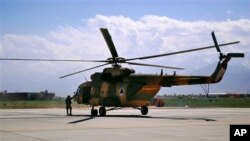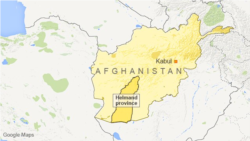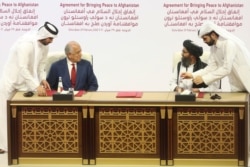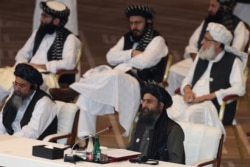Officials in Afghanistan said Wednesday two military helicopters collided and crashed in the embattled southern Helmand province, killing at least nine people aboard.
Separately, Taliban insurgents raided security outposts in other provinces and killed more than a dozen government forces.
Provincial authorities in Helmand said two Russian-made Mi-17 helicopters were evacuating wounded soldiers when both went down in Nawa district Tuesday night. The district center was said to be under a Taliban attack at the time.
The Afghan Defense Ministry confirmed the crash and blamed it on “technical issues” while the aircraft were taking off.
The midair collision came amid several days of intense battles between Afghan security forces and Taliban insurgents near the provincial capital, Lashkargah, and surrounding districts.
The United Nations said the fighting, which began Sunday, had uprooted thousands of civilians and interrupted critical health services in parts of Helmand, where most of the districts are controlled or contested by the Taliban.
“Local authorities report that some 35,000 people [around 5,000 households] have been displaced into Lashkargah city. Health facilities also report hundreds of casualties,” according to the latest U.N. assessment of the humanitarian situation. Electricity and telecommunication lines have been disrupted in some affected areas, it added.
The Taliban has made territorial advances in the province since launching Sunday’s large scale offensives and cut off highway access to Lashkargah city.
The insurgent group claimed its fighters had taken control of areas it had previously held. Taliban spokesman Zabihullah Mujahid told VOA Wednesday its fighters were consolidating their positions in Helmand but no “major offensive is currently underway” there.
The Taliban attack prompted the United States military to carry out airstrikes in support of Afghan forces in Helmand.
On Monday, U.S. commander of international forces in Afghanistan General. Scott Miller defended the military action, saying the insurgent offensive was “not consistent with the U.S.-Taliban agreement and undermines ongoing Afghan peace talks.”
U.S. acting ambassador to Afghanistan Ross Wilson urged the Taliban on Tuesday to stop its offensive in Helmand and reduce violence around the country.
“It should stop so that all parties can move toward a lasting and much-needed peace for all Afghans,” Wilson wrote on his Twitter account.
The Taliban has lately increased battlefield attacks even as its leaders hold peace talks with representatives of the Afghan government in Doha, Qatar.
The intra-Afghan dialogue stemmed from the February 29 pact the U.S. signed with the insurgents in its bid to promote a political settlement to the 19-year-old Afghan war.
The deal called for the withdrawal of all American and NATO forces from Afghanistan by May 2021.
In return, the insurgent group has pledged to prevent Afghan soil from becoming a hub of international terror groups in the future and reach a permanent cease-fire political deal with rival Afghan parties through the talks under way in the Qatari capital.
The intra-Afghan dialogue began September 12 but no significant breakthrough has been achieved so far.
Mujahid, while speaking to VOA, again ruled out a Taliban cease-fire, reiterating the issue is being debated in the intra-Afghan talks ongoing in Doha.







